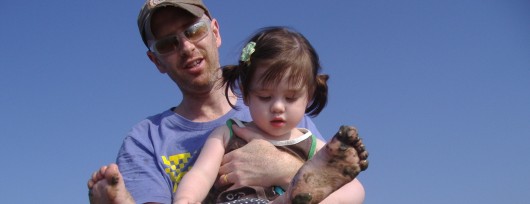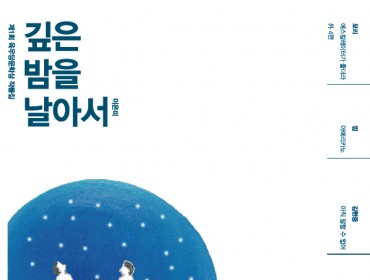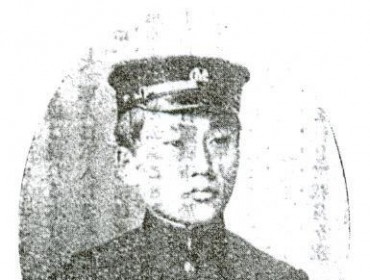By Ian Taylor Presnell
It was stupid to have come here. She knows that now, but she hasn’t even worked long enough to afford a plane ticket back home. And she knows that if she does quit after she’s made just enough to cover a ticket, then it will be another failure in her failed life, and it will be like she never even left at all. So she’s stuck here, for one year which is what she signed on for back in America, but one year didn’t feel as long when she was taking care of her father. The four months taking care of her father felt like forty, and after he died, she had to leave. To speed up her life, and catch up with the hologram of herself, who already had a home, a family, a career, and was moving faster every new day, meaning she was getting further and further away from the real her, who was still back in America, taking care of he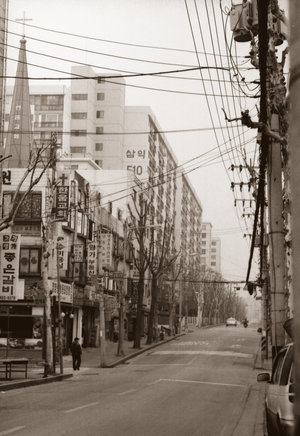 r dead father.
r dead father.
She’d been here three-and-a-half weeks, and didn’t feel any closer to fitting into or creating her own place than she did on that first day. The simplest tasks like buying a lamp or ordering food became dizzying, too much, so that she just turned around and walked back out into the street, frustrated and overwhelmed, wishing there were some way to give her frustration a voice. But there wasn’t any relief outside with all the fucking people, and motorcycles, and buses, and carts of fruit, and fish, and things she didn’t know the names of and would never have any desire to.
So no, she had not assimilated into the culture, but at least at home she could be at peace — be alone in a place of her own (it was something she had never had before). Always there could be a roommate walking in at any moment or a boyfriend, or her father coughing up blood in the middle of the night, her knowing that he was trying to be quiet and not disturb his daughter who had give up a chance to ____________ so she could return home, and not even help but just make more comfortable, like an extra pillow when someone’s already sleeping on the floor.
But she’s not even sure if she did make it more comfortable for him. There were times when she could feel his whole body turn rigid in embarrassment when she had to do the things that nobody ever discuses. And then he couldn’t even look at her, his jaw set, staring out the window with that expression of hatred (at her, at himself, at the disease) that trumped the exhaustion, the haggardness, the pain on his face that had aged twenty years in two.
When it came to the time when she had to perform these unmentionable things daily, he never stopped resisting; he didn’t accept any of it. He fought it so hard (just like he had fought everything his whole life he didn’t accept or permit) that she had had to pry his fingers from around the remote control for the trundle bed, not lift, not cajole, not move, — PRY when he finally passed. And she truly believes that the anger kept him alive longer, although that wasn’t its purpose, just simply a result: his body beaten long before the violent hatred that since it could not be violent (because violence requires a physical action) consumed itself and the disease both like the chemo might have done if he hadn’t refused it. She also believes that he hated his own feebleness and lethargy more than any of the rest of it.
He had with high success been mobile (carrying the disease) up until he crashed his car and broke his left leg and three ribs, and that is when she had come (was actually the first time she had even heard he was sick since the diagnosis over a year ago) and then stayed. He never asked her to stay; to this day she’s not even sure if he was glad she did. He had just asked her to come for a few days, and she’d stayed because how could she have left, and because she felt responsible and she loved him and knew that it would be soon, or if not soon, then not long, and basically because there wasn’t anybody else. But instead of some reconciliation (or not reconciliation because there was never a fight) or bonding in death or drawing closer in despair, they mostly spent their time in separate rooms watching two different TV’s, sometimes even watching the same channel because when she muted the sound to listen for him she heard the voices from his room coming out of the actors’ mouths on the living room set. And she wanted to go and sit with him, if just to watch something together, but she didn’t, not because of the smell or sounds or because of the way the light sometimes made horrible hollow landscapes on the wall, or anything that could do with why she might not want to, but because she wasn’t sure if he wanted her to.
So her own apartment was nice like some part of her knew it had to be, and that was what finally pushed her to actually just do it — to get on a plane and just go: an apartment without a roommate that was essentially free as long as she went to work everyday. The money wasn’t great, but the free apartment and the fact that it was very close to the farthest away she could go without coming back helped. Less than two weeks after the funeral she was in Asia, in one of the biggest cities in the world. A driver met her at the airport and drove her to her apartment, and her boss (who spoke exactly three words of English) and his boss’s wife and son took her to dinner, and then sleep, wonderful sleep — but that first night she woke up every hour, disoriented not knowing where she was and instinctively listening for her father but then she would realize where she was and fall asleep again, only to wake up an hour later scared and confused, out of bad dreams about people she hadn’t seen or thought about in years. At 5:30 (thousands of miles away now) her body informed her that she was awake now and would not be going back to  sleep anytime soon. Her body felt like it was still back in America and the throbbing in her head was the distance — the stretching of her mind going through customs trying to catch up to where her body lay 7,000 miles away in new her apartment alone at five in the morning.
sleep anytime soon. Her body felt like it was still back in America and the throbbing in her head was the distance — the stretching of her mind going through customs trying to catch up to where her body lay 7,000 miles away in new her apartment alone at five in the morning.
So she rearranged and unpacked and tried to fit things in places where they would be most advantageous to her particular needs and wants and a healthy state of mind. Then she showered and ventured out into this vast, bustling new world where everything was faster and peculiar and different in certain ways, but the same in others, and tried to find her place in it. She had an English map and twelve hours of sunlight to see whatever sites appealed to her most. She somehow found her way to Seoul Tower and paid to ride the elevator up and see this polluted cramped city covered in gray sweat, where everyone stared but didn’t speak. A white middle-aged man who had been on the elevator asked her to take his picture holding a newspaper he said would put the photo of himself in if he was holding it in one of a dozen landmarks, in which the tower of Seoul was one. That’s what he called it: the Tower of Seoul, which felt rather appropriate considering that her own language that she had mastered in every sense: writing, speaking, analyzing, listening, grammar, meant absolutely nothing here. After six hours in the city she would have given anything to talk to someone with a 3rd grade reading level.
So she didn’t find it strange later when she heard her own voice talking on walks home from work or in her apartment, trying to analyze her day as if for an audience that was even greener than she was. She finally decided it was healthy to talk to herself about the things she’d seen, but realized just how desperate she really was for conversation when she ran into a boy from America on the fourth day. She heard herself, how important and insightful she wanted her observations to be received as, but saw in his face that they really weren’t insightful or important at all (her observations weren’t). She was just babbling, and he had to go.
Nat knows she’s not by any means an expert on Korean culture, but she has the ability to see the differences between anywhere else in the world and America. America was in her pores, her heart still pumped American blood; she’d still be American even if she never steps foot there again. For twenty-five years she’s thought American thoughts and breathed American air; she was born there and she’ll die there even if she dies somewhere else fifty years from now. She’ll always see through American eyes with that cold calculation of not seeing: of seeing only what’s there in front of her in that exact moment — not what came before to create this now moment or what will come after but only now now now. And will only judge situations with how they will affect herself, and see through other people’s eyes only herself, and use her consciousness only to see where she fits in it all.
Just like she watched through those same eyes her father getting weaker and withering in that same house she was born in, where she experienced her first everything, and the same forest and waterfall behind it where she ran to get away from the house and the other people in it. As a child in the winter you might have found her there just sitting on a bench or a rock or a tree stump, just sitting there freezing and alone, not even moving, just her breath to confirm she was alive coming slow and calm as if the seasons didn’t even matter, as if she couldn’t even tell or was already so numb that she had stopped feeling.
But she did. She did feel it. Inside herself she felt it, and early on she had realized what some people never do: that the more you felt something like pain or cold or despair the longer it lasted, as if time itself slowed down to encompass the pain, and she knew that it wasn’t how long you lived… it was how long it felt. As a morbid reclusive child, at seven-years-old, her biggest concern (not fear) was of death, and so she sat in the cold sometimes for hours without gloves that FELT like days, and by the time she moved back in with her father in her mid 20’s she was already 100 years old and had extremely high tolerances for most all things unpleasant.
Tonight she misses the subway, her subway by three steps, and looks into the faces inside, stomping the floor one time with her right foot in defiance, as if to say, “Fuck you subway train.” Slowly she closes her eyes, and listens as the train moves away. She walks back to one of the benches against the wall and sits down. She reflects on her awful day: none of her classes understood her, and she had to sit at her computer for two hours straight listening to Korean teachers on all sides talking in what could not possibly be a language, just annoying whiny sharp chattering, like some wounded tropical bird. The anger came, and she had forgotten her MP3 player, and she had to just sit there and listen, wanting them all to just shut up. She chanted it to herself in her head, “Shut up, shut up, shut up.” The left arm of her chair was broken and her back hurt, and she didn’t understand why she had to just sit there for hours when she didn’t have any work to do or classes to teach. One of the teachers who never smiled at her no matter how severely Nat smiled, always just pushed Nat’s chair out of the way when she needed to get through. It was too much today.
She just wanted to go home, lock herself in her apartment and not come out again until Monday. But now she had to wait and then walk through her street for ten minutes where no one had any sense of advancement and just stood in the middle of the fucking sidewalk blocking her way on purpose, just to make her day worse, through all the garbage smells and people staring, and drunk old 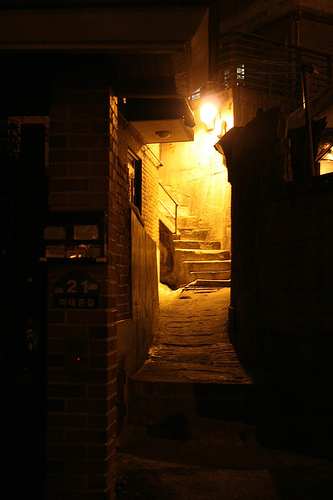 men saying hello, and disgusting food smells to her apartment that was filled with her own garbage because there were these special color-coded garbage bags that she had to separate plastics and glass and food into, and she didn’t know which colors were for what, and it should have been so simple to just throw everything that was garbage into one bag, and let the people who dealt with garbage sort through it. So she had just let it all stack up in one corner not dealing with it, knowing that she would have to deal with it eventually and everyday saying, “O.K. I’ll do it tomorrow,” but she never did. It was easier to just let it pile up until she couldn’t see her floor. At her father’s house the cleaning was instilled in her, and she did it without thinking because it’s what her mother did, and because her father was there to see it. Even after he died she did it out of habit because she still felt like one of them could walk in at any moment to say, “Nat you’ve really let the place go.”
men saying hello, and disgusting food smells to her apartment that was filled with her own garbage because there were these special color-coded garbage bags that she had to separate plastics and glass and food into, and she didn’t know which colors were for what, and it should have been so simple to just throw everything that was garbage into one bag, and let the people who dealt with garbage sort through it. So she had just let it all stack up in one corner not dealing with it, knowing that she would have to deal with it eventually and everyday saying, “O.K. I’ll do it tomorrow,” but she never did. It was easier to just let it pile up until she couldn’t see her floor. At her father’s house the cleaning was instilled in her, and she did it without thinking because it’s what her mother did, and because her father was there to see it. Even after he died she did it out of habit because she still felt like one of them could walk in at any moment to say, “Nat you’ve really let the place go.”
She didn’t sell, not out of loyalty or to preserve her memories; she doesn’t know why she didn’t. A neighbor broached it, the selling of the house, but she told him that she wasn’t going to sell, at least not right now. On her last day in America, she locked it up, and stood on the sidewalk staring at a house she could have drawn with her eyes closed, and waited and waited to feel some emotion — some signal but when she realized she was completely indifferent she got into the rental car and drove away from everything she had ever seen or known, into an airport, and boarded a plane that took her to California, and waited for three hours until another one took her to the other side of the world.
More people came and sat down on the other benches butted against the wall until her train came, and she stood up and boarded it and sat down again, and at the next stop the train stopped and more people got on and others got off and it started again, and then two stops later she got off and walked through all the congestion seeing it all like a bad dream she didn’t know she was inside of, waiting to smash and break and maim all the faces and motorcycles and taxi’s that blocked her from going and laying motionless in her room until she had to go to work again, or needed food, or got so lonely that she couldn’t imagine herself spending another second in the same apartment she wanted so desperately to reach now.
When she reached her building she entered her code and waited for the elevator to descend and then got inside, and analyzed her body in the mirror while it ascended upwards and opened at her floor where she unlocked her door and dropped her purse and took off all her clothes and poured a glass of Grey Goose and Ginger Ale she had bought two days ago that was almost empty now, and that she would eventually place next to the half-dozen other exact same empty liquor bottles arranged in what was taking the shape of a triangle, although she had just laid them there without thinking of any shape at all, adjacent to the pile of trash that she imagined piling up to the ceiling and heard the dog barking next door like it had yesterday and the day before until she couldn’t stand it anymore — even after another half glass of straight Grey Goose — and put her clothes back on and stomped over to the apartment beside her, even though it was only four steps away, and pounded on the door and waited and pounded some more, and the dog stopped barking, and in her frustration she turned the handle (not knob, not door knob) not expecting anything, but then the door opened and the motion light turned on and she saw a dog looking up at her happily, wagging it’s tail, inside an apartment identical to her own where she saw a blue shoe floating four feet above the ground attached to a white sock and an ankle but the rest of it (the rest of what) was behind a wall, and she built her own wall without any shape in mind like the vodka triangle to stop from knowing what was behind that real wall attached to that ankle.
She closed the door and walked back over to her own apartment, as the dog began barking again. She turned on the loudest fastest music on her computer, and drank another glass of vodka in the solitary green pebbled glass she owned, and paced back and forth back and forth, gulping down the drink, and suddenly gagging on it, falling to her knees, watching fiery drool fall out of her mouth onto her own floor, mesmerized by it, and following the warmth of the vodka all the way down to her stomach where it hardened and then spread all around with the other warmth inside her body, this foreign agent that the rest of her body didn’t like at all, except for her mind. She sat there on her knees, hunched over until the fire in her throat and mouth and insides cooled, and then slowly she stood and wiped up the drool and bile with a dirty shirt and turned off all lights, and lied down on her bed.
Now only her cheeks and ears were warm, but even in the dark she could see that blue shoe and ankle floating four feet above the ground, and in the dark both walls suddenly came down: the wall in her mind, and the one separating her apartment from the one next door. The dog was probably hungry, she thought. He’s probably starving, and who knows 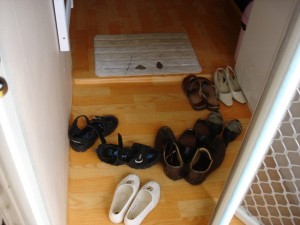 how long before the smell or unpaid bills or pissed-off employer made someone come to investigate. She would have to go and bring the dog to her apartment, not look, not touch anything, not go past the threshold of that wall, just grab the dog and walk it and buy food, and bring it into her apartment. Or just pour food and water inside the door, and let someone else deal with it. She couldn’t take care of a dog. She couldn’t take care of her father. She couldn’t even take care of herself. But how could she sleep in her bed not ten feet away from that shoe? The answer was simple; she couldn’t. And how could she go somewhere else without knowing what was behind that wall? Without seeing what she knew must be attached to that ankle?
how long before the smell or unpaid bills or pissed-off employer made someone come to investigate. She would have to go and bring the dog to her apartment, not look, not touch anything, not go past the threshold of that wall, just grab the dog and walk it and buy food, and bring it into her apartment. Or just pour food and water inside the door, and let someone else deal with it. She couldn’t take care of a dog. She couldn’t take care of her father. She couldn’t even take care of herself. But how could she sleep in her bed not ten feet away from that shoe? The answer was simple; she couldn’t. And how could she go somewhere else without knowing what was behind that wall? Without seeing what she knew must be attached to that ankle?
She knocked again, as if to prepare whatever was in there for her arrival. Even while knocking she knew it was absurd. She turned the handle slowly, and his motion light in the identical place as hers (the one that turned on every time she came out of the bathroom and that would always stay on for five seconds 10 seconds after she turned off all her other lights, and she’d have to wait for the darkness until that light decided to go out) turned on and everything was the same: the dog smiling and wagging it’s tail, the blue shoe, the chill and sudden drop in barometric pressure (even though that was impossible) as if everything in the apartment was waiting or just on the verge of waiting for someone to just open the door and see. She just stood there under the door scared and paralyzed and exhilarated, curious as to why there wasn’t any sort of smell, until the light turned off and the dog set it on again, and she looked down and saw other pairs of shoes arranged neatly on the small mat where all visitors were to take off their shoes. She stepped up the small rise that leveled into the kitchen, shoes still on, and turned on the kitchen light that she could control not by what she did but by what she wanted.
To Be Continued.
Ian Presnell is a capricorn. He’s way younger than he looks. He’s just decided that he’d be happy being either a famous comedian or a famous novelist. If he had a gun to his head he’d have to say that David Foster Wallace, Ayn Rand, Cormac McCarthy, A.M. Homes, Jonathan Franzen, and Hemingway are his favorite authors. More than anything he loves sleep, flirting, alcohol, books, being funny, food, and animals. if you see him say hello
ipresnel@gmail.com




